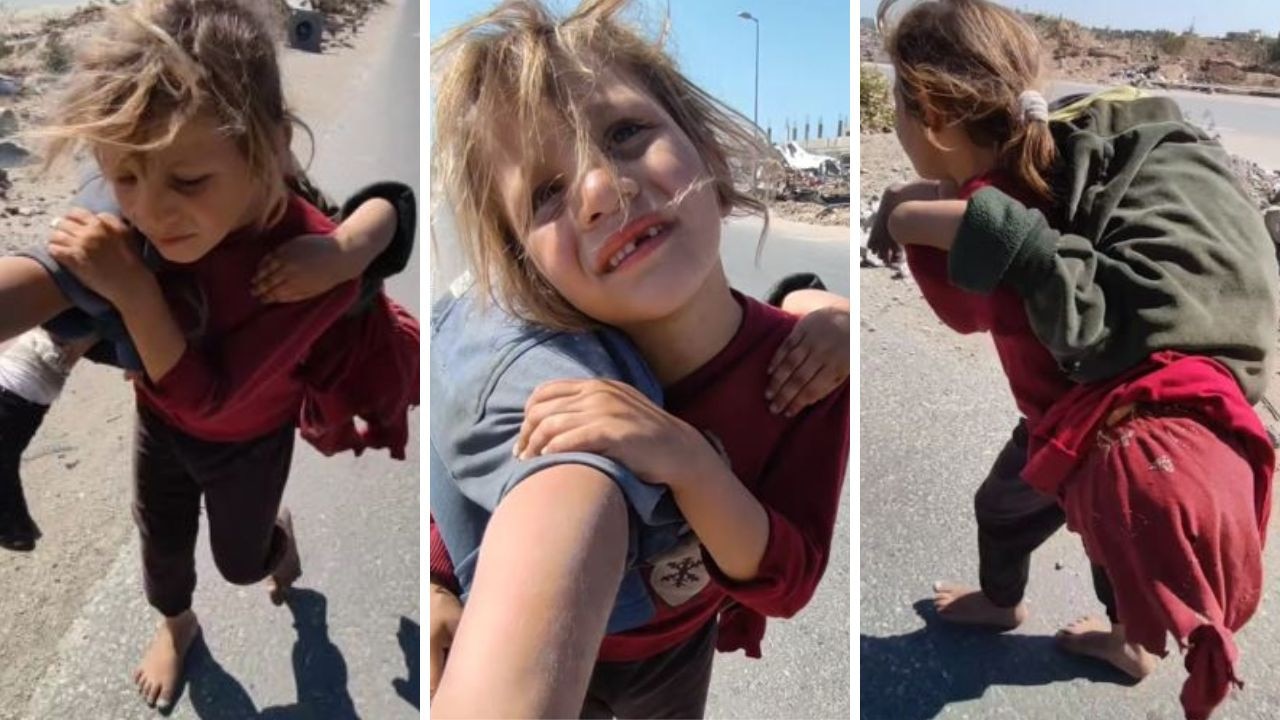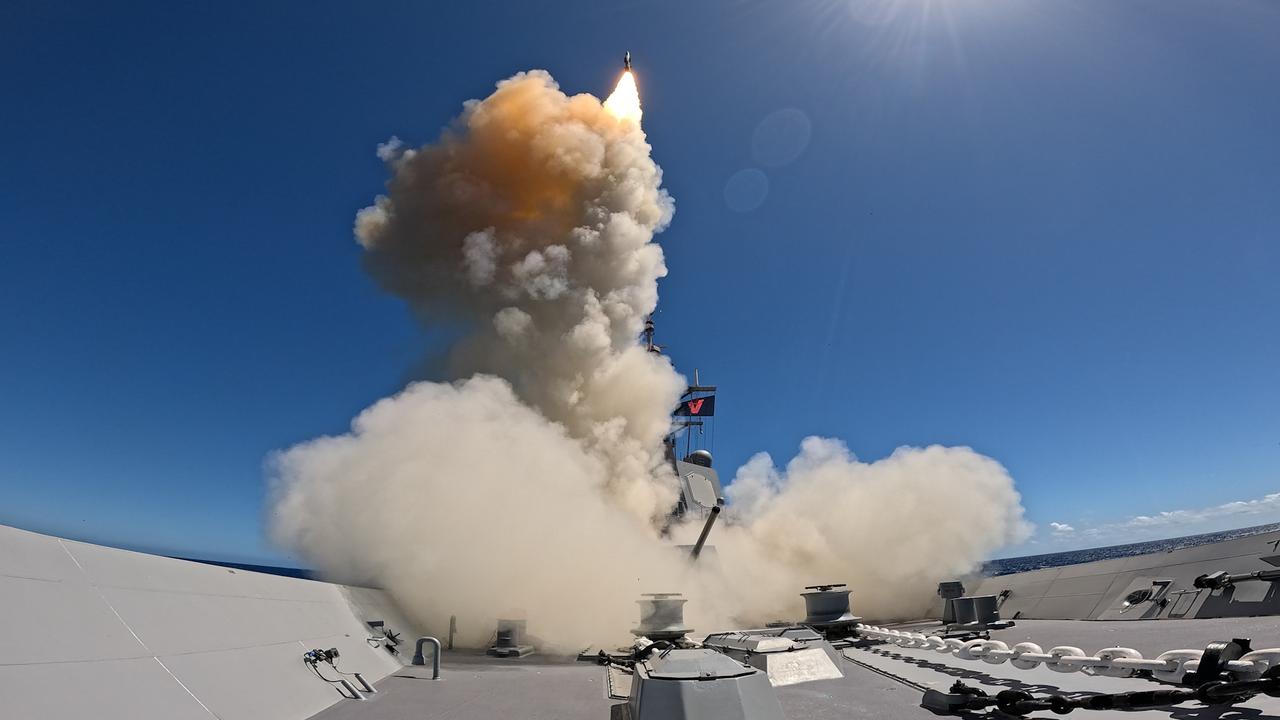China seeks ‘ceasfire through dialogue’ after Putin mobilisation address
Vladimir Putin has warned the West he has “lots of weapons” during a televised address where he announced a major new move against Ukraine.
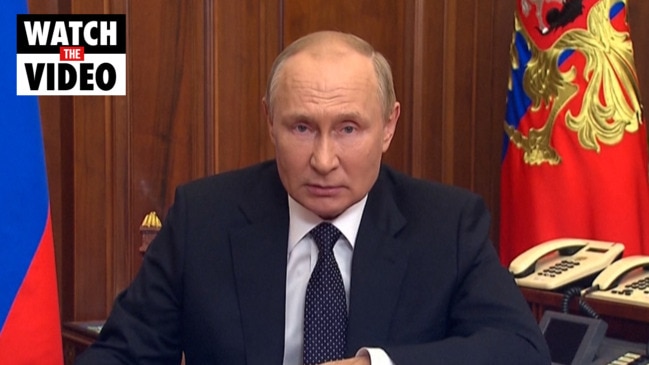
World
Don't miss out on the headlines from World. Followed categories will be added to My News.
China has called for a “ceasefire through dialogue and consultation”, following Russian President Vladimir Putin’s address on Ukraine in which he announced a partial military mobilisation.
“We call on the relevant parties to realise a ceasefire through dialogue and consultation, and find a solution that accommodates the legitimate security concerns of all parties as soon as possible,” China’s foreign ministry spokesman Wang Wenbin told a press briefing on Wednesday.
Putin announced the mobilisation earlier Wednesday and vowed to use “all available means” to protect Russian territory, after Moscow-held regions of Ukraine announced annexation referendums.
China and Russia have drawn closer in recent years as part of what they call a “no-limits” relationship that acts as a counterweight to the global dominance of the United States.
Last week Putin and Chinese leader Xi Jinping met in Uzbekistan for a regional summit and rallied Asian leaders behind a new “international order” challenging Western influence.
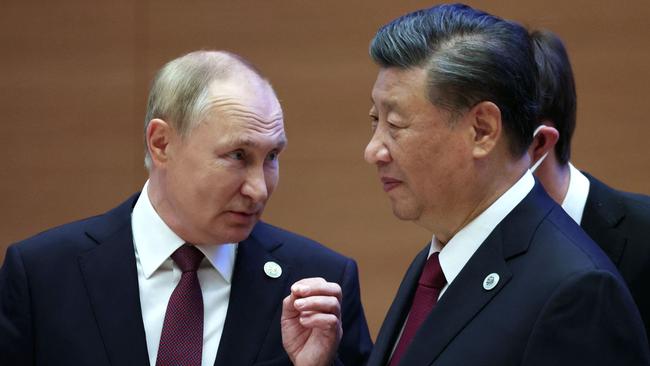
On Wednesday, Wang said China maintains “that the sovereign and territorial integrity of all countries should be respected, the purposes and principles of the UN Charter should be abided by, the legitimate security concerns of all countries should be taken seriously, and all efforts conducive to the peaceful resolution of crises should be supported.
“China calls on relevant parties to properly resolve their differences through dialogue and consultation, and is willing to work with the international community to continue to play a constructive role in de-escalating the situation.
Meanwhile Putin’s move to partially mobilise troops, along with a push for votes to annex occupied territories, showed his “desperation” at Moscow’s military failings in Ukraine, an EU spokesman said according to AFP.
“This is just another proof of Putin that he is not interested in peace, that he’s interested in escalating his war of aggression,” said EU spokesman Peter Stano.
“This is also yet another sign of his desperation with how his aggression is going against Ukraine.”
Germany had already condemned the move, AFP said.
The order for a partial military mobilisation is a “bad and wrong step”, German vice-chancellor Robert Habeck said.
“With the partial mobilisation, (Russia) is further escalating this war of aggression that violates international law,” said Economy Minister Habeck in a statement published by his ministry on Twitter. “A bad and wrong step, which we strongly condemn... We continue to fully support Ukraine.”
Chancellor Olaf Scholz believes the move signals that Russia’s campaign in Ukraine “is not going successfully”, his deputy spokesman Wolfgang Buechner told reporters at a regular press conference.
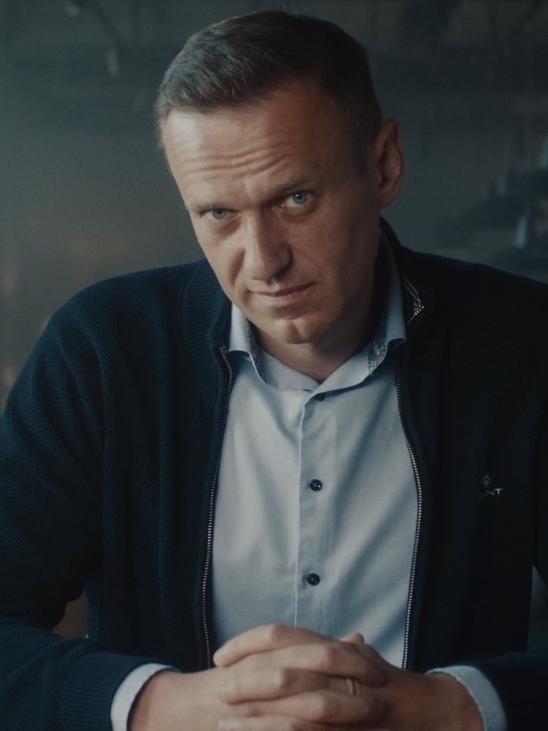
In Russia, jailed Kremlin critic Alexei Navalny said the partial mobilisation would lead to a “massive tragedy”, in a video statement during one of his court cases.
“This will result in a massive tragedy, in a massive amount of deaths,” he said, appearing in court via video-link, dressed in prisoner “In order to keep his personal power, Putin is tormenting a neighbouring country, killed people there and is now sending a huge quantity of Russian citizens into this war.
“It is clear that this criminal war that is going on... is only deepening and getting worse, and Putin wants to involve as many people as possible.”
Putin “wants to bloody the hands of hundreds of thousands of people,” Navalny added.
Several opposition activists on social media have called for protests in Russian cities on Wednesday evening.
CHILLING NEW THREAT
Vladimir Putin has warned he is prepared to use all the weapons Russia has as he accused the west of trying to “destroy” his country.
Putin made the chilling warning during a televisied address where he announced reserve troops were being called into his faltering war in Ukraine.
“When the territorial integrity of our country is threatened, we will certainly use all the means at our disposal to protect Russia and our people. This is not a bluff,” Putin said.
He accused the West of trying to “weaken, divide and ultimately destroy our country”.
Putin announced “partial” mobilisation in Russia, in an escalation of what Moscow calls its military operation in Ukraine.
“I consider it necessary to support the proposal of the Defence Ministry and of the General Staff to conduct partial mobilisation in the Russian Federation,” he said, confirming that a relevant decree has already been signed.
“I stress it is partial mobilisation. Only those who are currently in reserve will be conscripted and also those who have served in the army and have certain military professions,” he said.
Putin also falsely accused Western countries of trying to “block” the independence of the so-called people’s republics in eastern Ukraine.
“In order to force their will in brutal ways to other people. The aim of the West is still weaken and destroy, they are openly saying that,” he said.
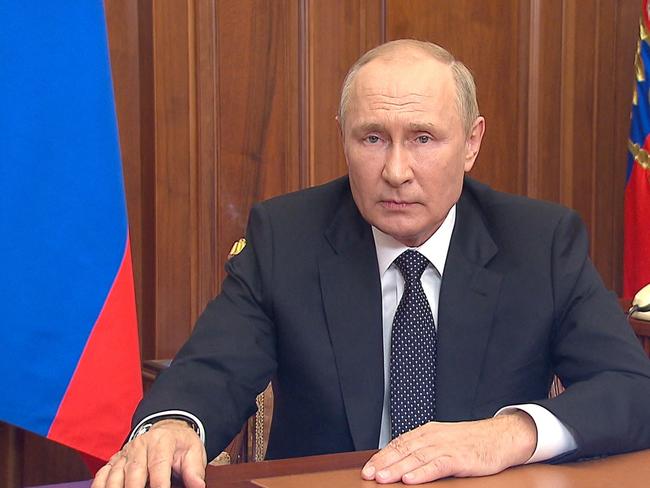
“The politics of terror and intimidation against Russia becomes more and more barbaric.”
The major address to the Russian people is his first since Russia invaded Ukraine in February.
Russia had been in a state of bewilderment after his expected address to the nation was “delayed” without explanation.
Western countries are trying to keep their supremacy at all costs and they’re trying to block and suppress any independent centres of development,” Mr Putin said in the pre-recorded address, broadcast and translated on Sky News.
“In 1981, they managed to split the Soviet Union and now is the time for Russia itself, that Russia will have to fold into many regions and areas, which are fighting each other to the death.”
The White House was expecting the announcement of a “general mobilisation” of the Russian military in a possible pretext for full-scale war.
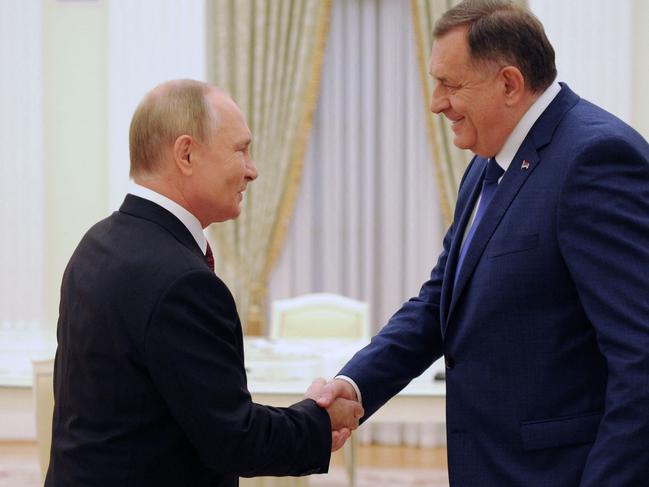
But broadcasters awaited the speech for hours with no sign of Mr Putin or reason for his absence, suggesting “pretty chaotic” scenes in the Kremlin.
“We saw it announced that it was going to be at 8 o’clock Moscow time. We’ve just seen a tweet from RT to say it’s not going to be on at 8 o’clock Moscow time – and anyway that has now passed,” retired senior British Army officer General sir Richard Shirreff told Sky News.
“So this says to me there is a certain amount of chaos.”
Mr Putin’s former advisor, Sergei Markov, announced on his Telegram channel that the national address had been delayed for a day, while the editor of Russian state media outlet RT wrote cryptically on Telegram: “Go to sleep”.
It was to have been the first time the Russian president addressed the nation since Russia invaded Ukraine on February 24 this year.
It’s believed Mr Putin would have focused on the Russian-occupied areas of four Ukrainian regions that have set out plans for referendums on joining Russia.
Voting will take place between September 23 and 27 in the Luhansk, Donetsk, Kherson and Zaporizhzhia provinces, representing around 15 per cent of Ukrainian territory or an area about the size of Hungary.
Their integration into Russia would represent a major escalation of the conflict in Ukraine as Moscow would be able to say it is defending its own territory from Ukrainian forces.
“The People’s Council ruled … to set the days of the referendum for September 23 to September 27,” separatist official Denis Miroshnichenko said as cited by the Lugansk news portal.
Ukraine dismissed the plans as a stunt by Moscow to try to reclaim the initiative after crushing losses on the battlefield.
“The Russians can do whatever they want. It will not change anything,” Ukraine’s Foreign Minister Dmytro Kuleba said in response to the referendums.
Sham referendums have no legitimacy & do not change the nature of #Russia’s war of aggression against #Ukraine. This is a further escalation in Putin’s war. The international community must condemn this blatant violation of international law & step up support for Ukraine. pic.twitter.com/NdcN3tO6Sy
— Jens Stoltenberg (@jensstoltenberg) September 20, 2022
Meanwhile Russia’s parliament rushed through a bill on Tuesday that introduces stricter punishments for desertion, failure to follow orders, surrendering to the enemy, and refusal to fight in the time of martial law, the clearest sign yet that the Kremlin may be considering declaring a general mobilisation.
The bill now needs to receive the upper house’s approval and then be signed by Mr Putin to become law — steps that are considered to be formalities.
Tatyana @Stanovaya whose predictions of the war have sadly for all of us been consistently true says the Kremlin with the Duma vote today and referendum announcement is gearing up for an "all-out war" unless Ukraine and the West back down.
— Nataliya Vasilyeva (@Nat_Vasilyeva) September 20, 2022
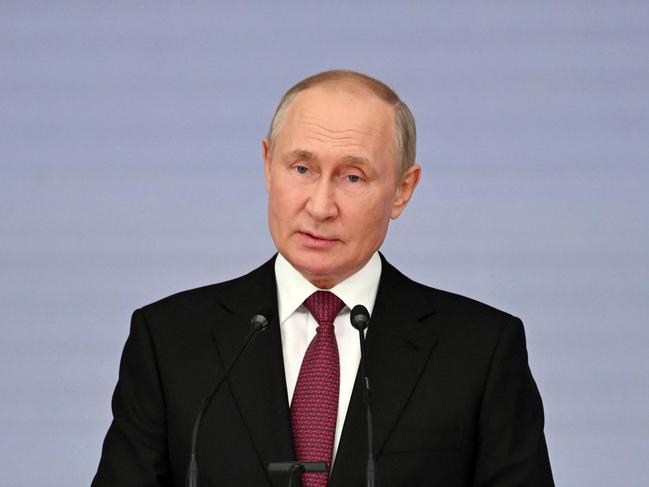
WARNING COMES AS LEADERS MEET IN NYC
Mr Putin’s address was due to come as about 157 heads of state and representatives of governments gather at the 77th UN General Assembly in New York from Tuesday until Sunday this week. The war in Ukraine and its ramifications are expected to be the major theme along with the rippling impact of rising food prices on people across the world; the energy crisis roiling the global economy; and climate change.
Four notable world leaders will not be in attendance at the annual gathering of leaders at the United Nations this week: Russia, China, India and Ethiopia.
They will be represented by ministers who, in accordance with United Nations protocol, will deliver speeches later in the week after all the heads of states and governments have spoken at the General Assembly hall. Sergei Lavrov will be the highest ranking member of the Russian government to attend on behalf of Mr Putin.
Ukrainian President Volodymyr Zelenskyy will address the assembly in a prerecorded video speech. The General Assembly voted on Friday to grant him an exemption to the rule mandating that all speeches must be delivered in person this year.
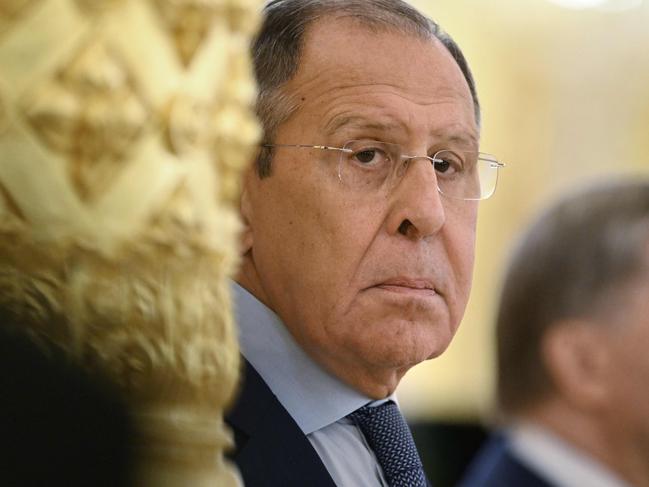
US Ambassador to the United Nations Linda Thomas-Greenfield met with Ukrainian Foreign Minister Dmytro Kuleba on Tuesday. The pair condemned the announcement of referendums announced by Russian-backed officials within Ukraine’s internationally recognised borders, according to Nate Evans, a spokesman for the United States Mission to the United Nations.
Ms Thomas-Greenfield “reiterated that the United States will not recognise any attempt by Russia to claim annexation of Ukraine’s sovereign territory,” Mr Evans said.
The referendums “are an affront to the principles of sovereignty and territorial integrity that are at heart of the UN Charter,” he added.
The Pentagon said that declarations from leaders of the self-declared Luhansk and Donetsk People’s Republics to hold referendums on joining the Russian Federation are serving as a distraction after Ukraine’s successful counteroffensive.
“This is simply an information operation that’s meant to distract from the difficult state that the Russian military currently finds itself in,” Pentagon press secretary Brigadier General Pat Ryder said during a briefing at the Pentagon on Tuesday.
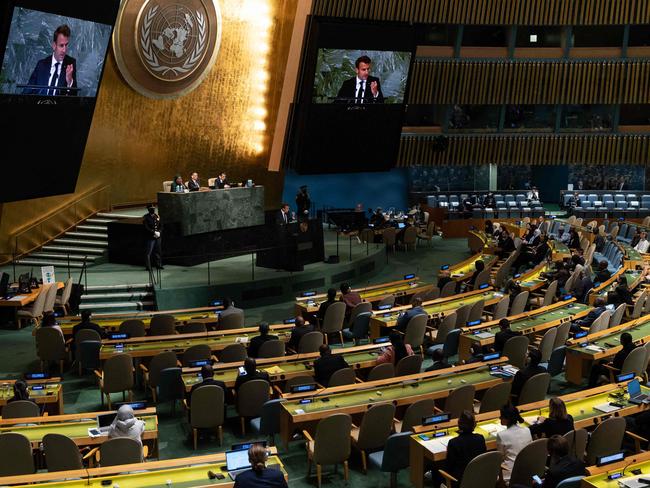
‘WINTER OF GLOBAL DISCONTENT’
Earlier, UN Secretary-General Antonio Guterres warned that the planet is in a dire state in his opening remarks to world leaders at the General Assembly.
“A winter of global discontent is on the horizon,” he said on Tuesday.
“Trust is crumbling, inequalities are exploding, our planet is burning. People are hurting – with the most vulnerable suffering the most.”
Mr Guterres offered a grim assessment of global affairs, saying that “our world is in peril and paralysed”.
“We are gridlocked in colossal global dysfunction,” he said, adding that the international community “is not ready or willing to tackle” these challenges.
Mr Guterres previously said the gathering of world leaders in New York must provide hope through dialogue, debates and concrete plans to overcome divisions and crises.
More Coverage
Originally published as China seeks ‘ceasfire through dialogue’ after Putin mobilisation address



